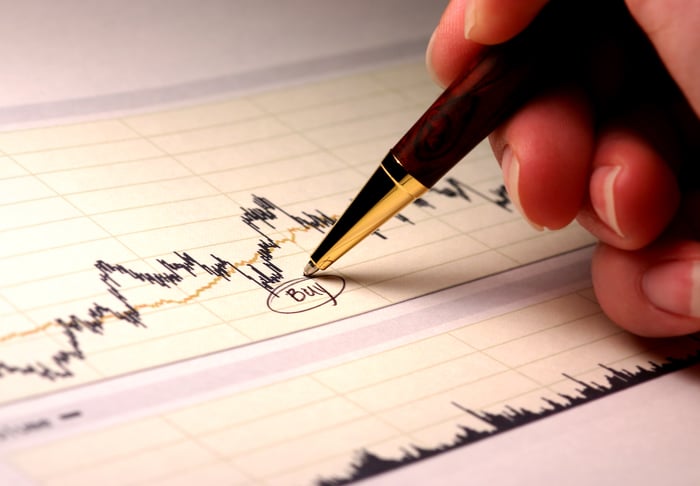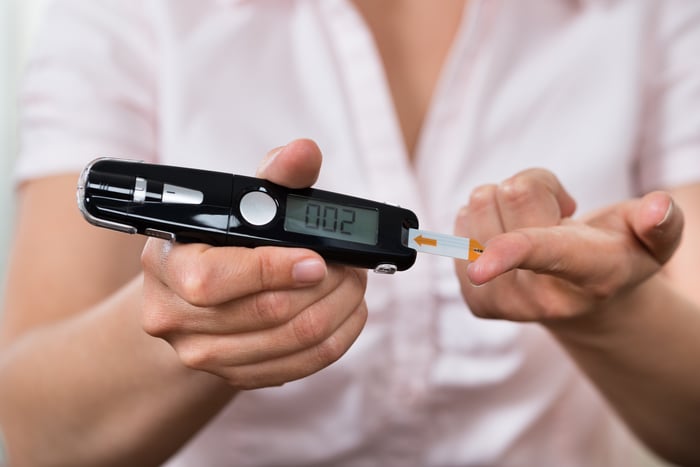For the past two-plus months, investors have been taken for a wild ride. Since the benchmark S&P 500 (^GSPC -0.22%) hit its all-time-high closing on Feb. 19, we've witnessed (in no particular order):
- The S&P 500 dip into its fastest bear market in history (just 17 trading sessions).
- The S&P 500 take just 30 calendar days to lose at least 30% of its value, which is roughly 10 times quicker than it typically takes for a bear market to erase 30% of the index's value.
- The highest CBOE Volatility Index reading in history.
- The broad-based index log its eight biggest single-day gains and 10 of its 13 largest single-session declines in point terms.
- May contract West Texas Intermediate crude oil futures briefly turn negative.
- More than 26 million people file for unemployment benefits.
In short, we've witnessed the coronavirus completely upend everything we were familiar with in a very short time frame.

Image source: Getty Images.
It's time for long-term investors to go shopping
But if there's one key takeaway from any stock market correction or bear market in history, it's that brighter days always lie ahead.
Dating back to the beginning of 1950, there have been 38 separate corrections in the S&P 500 totaling at least 10%, not including rounding. With the exception of the ongoing correction, the previous 37 moves lower in the S&P 500 have all, eventually, been erased by a bull market rally. This means that buying great companies during periods of weakness tends to be a surefire way to build long-term wealth.
The question, as always, is: What top stock(s) to buy?
As we get ready to turn the page on April and barrel headlong into May, my single best investment idea this month is digital healthcare-solutions provider Livongo Health (LVGO).
Livongo Health is a data-driven company that provides a platform of wirelessly connected products to help patients with chronic illnesses (e.g., diabetes, hypertension, and obesity) lead healthier lives. Interestingly enough, whereas most stocks were hammered during the coronavirus crash, Livongo's share price has risen by nearly 50% since the S&P 500 hit its all-time high two months ago.

Image source: Getty Images.
Despite its recent outperformance, Livongo Health does have near-term risks
Does this mean it's impervious to near-term disruptions caused by the COVID-19 pandemic? Not exactly.
Among the many ways Livongo grows its business, it relies on an increasing number of enterprise clients. These clients come from all walks of the business world, from big corporations to government entities and labor unions. With more than 26 million people losing their jobs in a four-week stretch because of the shutdown of nonessential businesses due to COVID-19, it's quite possible Livongo Health's enterprise-client growth could come in a bit lower than what was initially forecast. In other words, businesses aren't going to deploy capital on worker wellness if no one's working. So that's one very-near-term hurdle you'll want to keep in mind.
The only other serious near-term concern is that Livongo Health hasn't transitioned to recurring profitability, although it is very close. In a bull market and with an expanding U.S. economy, Wall Street is more than willing to look past near-term losses and focus on a company's growth rate, outlook, and market share within a specific niche. But during a bear market, value investing often takes priority. This could possibly limit Livongo's return potential until it officially turns the corner to recurring profitability.
All publicly traded companies have risks, even those that look like no-brainer buys. But if you can look past these near-term challenges, Livongo Health appears to have 10-bagger written all over it.

Image source: Getty Images.
Here's why now is the time to buy Livongo Health
Easily the biggest differentiating factor in what will very likely remain a highly competitive space is Livongo's focus on mining patient data and using artificial intelligence to help patients with chronic conditions make smart choices.
Right now, Livongo's focus is almost entirely on patients with diabetes. It's an indication that currently affects 34.2 million Americans (10.5% of the population), with another 88 million people experiencing signs of pre-diabetes. If these 88 million people don't change their diet and exercise habits, roughly 1 in 3 Americans could, at some point in the future, have diabetes. The potential patient pool is massive, and Livongo has just begun to tap into it with its 222,700 diabetes members, as of the end of 2019.
Aside from the co-morbidities diabetics face, a big issue is that they lack the direction to take proper care of themselves. This is where Livongo steps in and provides behavioral tips to permanently alter how patients care for themselves. Ultimately, it results in healthier, happier patients -- and businesses would seem to agree.
Last year, both Livongo's diabetes member count and its enterprise client count came very close to doubling, with the company's client contract-retention rate at a healthy 94%. Revenue from its high-margin services grew nearly 150% in 2019, with Wall Street counting on sales growth of 73% in 2020 and 56% in 2021, according to the current consensus. With a gross margin north of 70%, it won't be long before Livongo Health is profitable.
This is another point worth mentioning: Livongo's business is based on contracts and subscriptions. With a retention rate of 94%, this leads to extremely predictable sales and cash flow, allowing Livongo Health to plot out its spending well in advance.
Additionally, don't overlook the trend toward telemedicine that COVID-19 has brought to the forefront. Livongo's wirelessly connected devices and data-mining platform are perfectly built for an environment where telemedicine has a growing presence.
Although the near-term could remain volatile, if you have at least a five-year (but preferably a 10-year) investment time frame, I highly doubt you'll regret buying Livongo Health in May.





